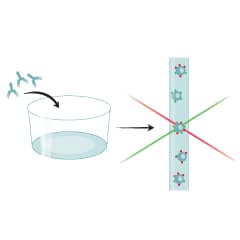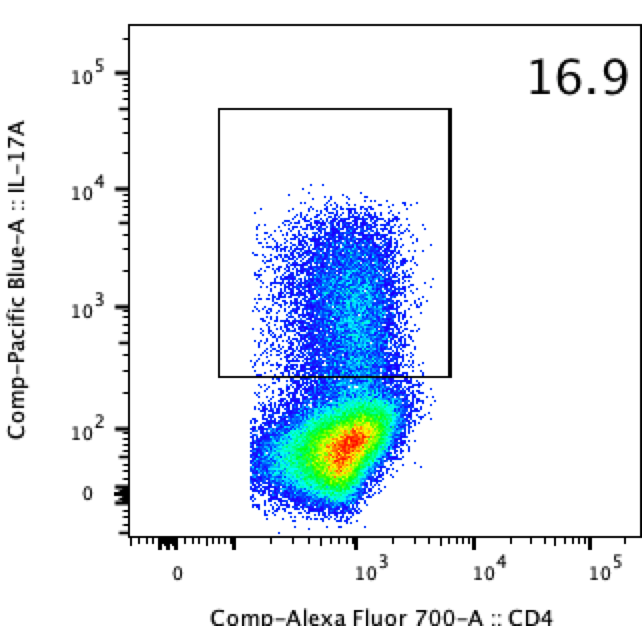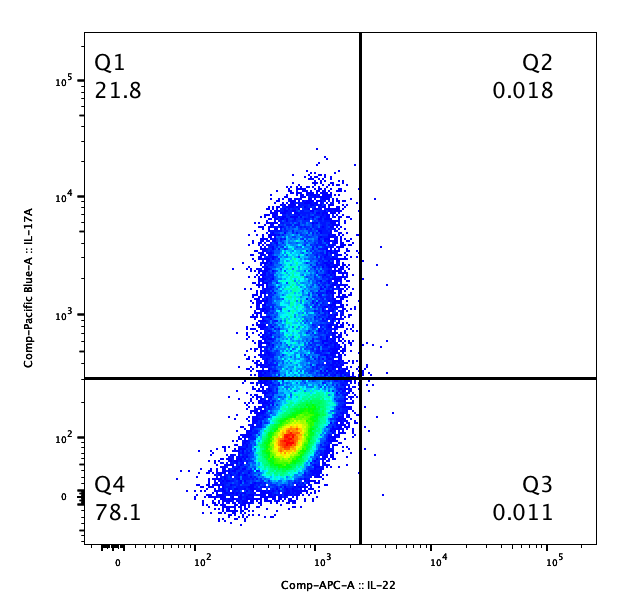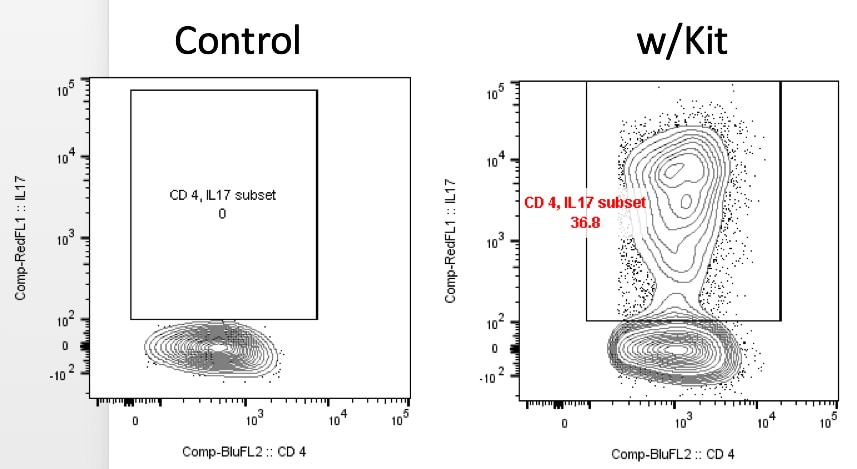CellXVivo Mouse Th17 Cell Differentiation Kit
CellXVivo Mouse Th17 Cell Differentiation Kit Summary
Kit Summary
For the differentiation of Th17 cells from a preparation of CD4+ T cells isolated from mouse splenocytes.
Key Benefits
- Provides optimized reagents needed to induce Th17 differentiation
- Yields ~200 x 106 cells, of which > 40% are Th17 polarized
- Contains high quality bioactive proteins
- Includes straightforward procedures
- Does not require specialized instrumentation
Why Expand Th17 Cells Ex Vivo?
T helper type 17 (Th17) cells are a subset of CD4+ effector T cells that promote cell-mediated immune responses against extracellular bacteria and fungi. Differentiation into the Th17 lineage is promoted by cytokines such as TGF-beta and IL-6, while their survival and expansion are dependent on IL-21 and IL-23. Th17 cells secrete TNF-alpha, IL-6, IL-9, IL-17A, IL-17F, IL-21, and IL-22. Th17 polarized cells are present in low abundance in normal mouse spleen and peripheral blood. In vitro differentiation of mouse Th17 cells from the larger naïve CD4+ T cell population provides increased numbers of Th17 cells to facilitate downstream research.
This kit contains the following reagents for the ex vivo differentiation of mouse Th17 cells.
- Hamster Anti-Mouse CD3
- Rat Anti-Mouse CD28
- Mouse Th17 Reagent 1
- Mouse Th17 Reagent 2
- Mouse Th17 Reagent 3
- Mouse Th17 Reagent 4
- Mouse Th17 Reagent 5
- Reconstitution Buffer 1
- Reconstitution Buffer 2
- Reconstitution Buffer 3
- 20X Wash Buffer
The quantity of the components in the kit is sufficient to differentiate approximately 50x106 naïve CD4+ T cells, and generate ~200 x 106 cells, of which >40% are Th17 polarized cells within your starting CD4+ T cell population.
Note: Results may vary due to strain age and/or the health of the mice used for isolation.
Stability and Storage
Store the unopened kit at ≤-20 °C. Do not use past the kit expiration date. *Provided this is within the expiration date of the kit.
Limitations
- FOR LABORATORY RESEARCH USE ONLY. NOT FOR USE IN DIAGNOSTIC PROCEDURES.
- The safety and efficacy of this product in diagnostic or other clinical uses has not been established.
- This reagent should not be used beyond the expiration date indicated on the label.
- Results may vary due to variations among cells derived from different donors.
Specifications
Product Datasheets
Scientific Data
 View Larger
View Larger
Differentiated Mouse CD4+ Cells Secrete IL-17. Mouse T cells were differentiated for 5 days under Th17 polarization conditions using reagents included in this kit. On day 5, cell culture supernatant was collected and cytokine secretion was determined using the Mouse IL-17 Quantikine®ELISA Kit, the Mouse IFN-γ Quantikine®ELISA Kit, and the Mouse IL-4 Quantikine®ELISA Kit.
 View Larger
View Larger
Intracellular Cytokine Staining of Differentiated Mouse Th17 Cells. Flow cytometry data showing mouse naïve CD4+T cells without (A, C) and with (B, D) a 5 day differentiation using reagents included in this kit. On day 5 of differentiation, the cells were stimulated with Cell Activation Cocktail (Tocris®, Catalog # 5476) and stained with Mouse IL-17, Mouse IFN-gamma, and Mouse IL-4 Monoclonal Antibodies. Quadrants were set based on isotype-stained samples.
Assay Procedure
Refer to the product datasheet for complete product details.
Briefly, CD4+ T cells isolated from mouse splenocytes are differentiated ex vivo into the Th17 phenotype with reagents provided in the CellXVivo™ Mouse Th17 Cell Differentiation Kit using the following procedure:
- Isolate CD4+ T cells from mouse splenocytes
- Culture CD4+ T cells in reagents provided in kit
- Verify Th17 cell expansion after 5 days in culture
Reagents Supplied in the CellXVivo™ Mouse Th17 Cell Differentiation Kit (Catalog # CDK017):
- Hamster Anti-Mouse CD3
- Rat Anti-Mouse CD28
- Mouse Th17 Reagent 1
- Mouse Th17 Reagent 2
- Mouse Th17 Reagent 3
- Mouse Th17 Reagent 4
- Mouse Th17 Reagent 5
- Reconstitution Buffer 1
- Reconstitution Buffer 2
- Reconstitution Buffer 3
- 20X Wash Buffer
Reagents
- Laboratory mice
- XVIVO™ 15 Chemically Defined, Serum-free Hematopoietic Cell Medium (Lonza, or equivalent)
- MagCellect™ Mouse Naïve CD4+ T Cell Isolation Kit (R&D Systems, Catalog # MAGH115, or equivalent)
- Penicillin/Streptomycin (optional)
- Cell Activation Cocktail 500X (Tocris®, Catalog # 5476)
Equipment
- Tissue culture plates and/or flasks
- Sterile deionized water
- Pipettes and pipette tips
- Inverted microscope
- Hemocytometer
- 37 °C, 5% CO2 incubator
- Centrifuge
Note: Results may vary due to strain, age, and/or the health of the mice used for isolation.
Coat the desired tissue culture plate or flask with Hamster Anti-Mouse CD3 antibody.

Isolate mouse splenocytes.

Perform a cell count.

Perform a cell count.

Suspend 1 x 106 naïve CD4+ T cells/mL in Mouse Th17 Differentiation Media. Culture the cells on plates or flask pre-coated with Hamster Anti-Mouse CD3 antibody.

Refresh with Mouse Th17 Differentiation Media on day 3. Culture for 2 more days.

Verify Th17 cell differentiation by analyzing cytokine expression via flow cytometry or ELISA (optional).

Citations for CellXVivo Mouse Th17 Cell Differentiation Kit
R&D Systems personnel manually curate a database that contains references using R&D Systems products. The data collected includes not only links to publications in PubMed, but also provides information about sample types, species, and experimental conditions.
15
Citations: Showing 1 - 10
Filter your results:
Filter by:
-
IL-37 Isoform A Prevents Collagen-Induced Arthritis in Mice by Modulating the Th17/Treg Balance via IL1R8 Receptors
Authors: Lyu, S;Fang, Z;Hu, Y;Zhang, M;He, J;Wang, X;He, J;Gao, X;Wang, H;Xu, D;Wang, Q;
International journal of molecular sciences 2024-11-29
-
Activation of ?2B/2C adrenergic receptor ameliorates ocular surface inflammation through enhancing regulatory T cell function
Authors: Fan, NW;Yu, M;Wang, S;Blanco, T;Luznik, Z;Chauhan, SK;Viswanath, V;Gil, D;Held, K;Chen, Y;Dana, R;
Mucosal immunology 2024-11-08
-
Anti-inflammatory effect of the combined treatment of LMT-28 and kaempferol in a collagen-induced arthritis mouse model
Authors: Jeong, YJ;Park, SA;Park, YH;Kim, LK;Lee, HR;Kim, HJ;Heo, TH;
PloS one 2024-07-31
-
ASM is a therapeutic target in dermatomyositis by regulating the differentiation of naive CD4?+?T cells into Th17 and Treg subsets
Authors: Chen, Y;Liu, H;Luo, Z;Zhang, J;Dong, M;Yin, G;Xie, Q;
Skeletal muscle 2024-07-18
-
Therapeutic effects of candesartan in inflammatory skin disorders by suppressing Th17 differentiation
Authors: Son, SE;Im, DS;
International immunopharmacology 2023-10-04
-
Leukemic mutation FLT3-ITD is retained in dendritic cells and disrupts their homeostasis leading to expanded Th17 frequency
Authors: Flynn, PA;Long, MD;Kosaka, Y;Mulkey, JS;Coy, JL;Agarwal, A;Lind, EF;
bioRxiv : the preprint server for biology 2023-09-22
-
Inhibition of NLRP3 Inflammasome Activation by 3H-1,2-Dithiole-3-Thione: A Potential Therapeutic Approach for Psoriasis Treatment
Authors: Shih, MC;Li, CL;Liao, EC;Yen, CY;Yen, LJ;Wang, KC;Lu, LY;Chou, TY;Chen, YC;Yu, SJ;
International journal of molecular sciences 2023-08-31
-
Inhibition of pyruvate dehydrogenase kinase 4 in CD4+ T cells ameliorates intestinal inflammation
Authors: H Lee, JH Jeon, YJ Lee, MJ Kim, WH Kwon, D Chanda, T Thoudam, HS Pagire, SH Pagire, JH Ahn, RA Harris, ES Kim, IK Lee
Cellular and Molecular Gastroenterology and Hepatology, 2022-10-10;0(0):. 2022-10-10
-
tRNA-m1A modification promotes T cell expansion via efficient MYC protein synthesis
Authors: Y Liu, J Zhou, X Li, X Zhang, J Shi, X Wang, H Li, S Miao, H Chen, X He, L Dong, GR Lee, J Zheng, RJ Liu, B Su, Y Ye, RA Flavell, C Yi, Y Wu, HB Li
Nature Immunology, 2022-09-22;0(0):. 2022-09-22
-
Free Fatty Acid Receptor 4 (FFA4) Activation Ameliorates Imiquimod-Induced Psoriasis in Mice
Authors: SE Son, JM Koh, DS Im
International Journal of Molecular Sciences, 2022-04-19;23(9):. 2022-04-19
-
Vaccination by Two DerG LEAPS Conjugates Incorporating Distinct Proteoglycan (PG, Aggrecan) Epitopes Provides Therapy by Different Immune Mechanisms in a Mouse Model of Rheumatoid Arthritis
Authors: DH Zimmerman, K Mikecz, A Markovics, RE Carambula, JC Ciemielews, DM Toth, TT Glant, KS Rosenthal
Vaccines, 2021-05-02;9(5):. 2021-05-02
-
miR-451a levels rather than human papillomavirus vaccine administration is associated with the severity of murine experimental autoimmune encephalomyelitis
Authors: M Nakashima, K Ishikawa, A Fugiwara, K Shu, Y Fukushima, M Okamoto, H Tsukamoto, T Kouwaki, H Oshiumi
Scientific Reports, 2021-04-30;11(1):9369. 2021-04-30
-
Discovery of a novel ROR&gamma antagonist with skin-restricted exposure for topical treatment of mild to moderate psoriasis
Authors: S Liu, D Liu, R Shen, D Li, Q Hu, Y Yan, J Sun, F Zhang, H Wan, P Dong, J Feng, R Zhang, J Li, L Zhang, W Tao
Scientific Reports, 2021-04-28;11(1):9132. 2021-04-28
-
T cell-intrinsic role for Nod2 in protection against Th17-mediated uveitis
Authors: RJ Napier, EJ Lee, MP Davey, EE Vance, JM Furtado, PE Snow, KA Samson, SJ Lashley, BR Brown, R Horai, MJ Mattapalli, B Xu, MC Callegan, LS Uebelhoer, CL Lancioni, RK Vehe, BA Binstadt, JR Smith, RR Caspi, HL Rosenzweig
Nat Commun, 2020-10-26;11(1):5406. 2020-10-26
-
PTH induces bone loss via microbial-dependent expansion of intestinal TNF+ T cells and Th17 cells
Authors: M Yu, A Malik Tyag, JY Li, J Adams, TL Denning, MN Weitzmann, RM Jones, R Pacifici
Nat Commun, 2020-01-24;11(1):468. 2020-01-24
FAQs
-
How long are the cytokines stable after they are diluted in the Mouse Th17 Differentiation Media, in Catalog # CDK017? Can I prepare the Differentiation Media with cytokines on day 1 of the protocol, and use the same media on day 3, or do I need to add freshly diluted cytokines at each refresh step?
We have not performed any stability testing to detemine how long diluted cytokines are stable in media without any activity loss. However, during the development of the CDK017 kit, we prepared complete Mouse Th17 Differentiation Media with cytokines added on day 1 and used it until the end of the experiment (refreshing media on day 3 and harvesting on day 5). Cytokines are most stable in medias containing 5-10% serum. We recommend X-VIVO 15 Chemically Defined, Serum-free Hematopoietic Cell Medium (Lonza, or equivalent), which contains HSA that will help stabilize the cytokines for shorter periods.
-
Can I sterile filter the Mouse Th17 Differentiation Media in Catalog # CDK017 after the addition of the cytokines?
Yes, the complete media may be filtered after addition of cytokines. A 0.2 micron low protein binding sterile filter may be used.
Reviews for CellXVivo Mouse Th17 Cell Differentiation Kit
Average Rating: 4.9 (Based on 7 Reviews)
Have you used CellXVivo Mouse Th17 Cell Differentiation Kit?
Submit a review and receive an Amazon gift card.
$25/€18/£15/$25CAN/¥75 Yuan/¥2500 Yen for a review with an image
$10/€7/£6/$10 CAD/¥70 Yuan/¥1110 Yen for a review without an image
Filter by:
Many thanks to this kit! The paper is accepted with the help of this kit!
I was struggling with Th17 differentiation for a couple of months. Finally figure it out with this FANTASTIC kit!. I highly recommend it!
This kit has made my assay much more easier. It's an all-in-one!




